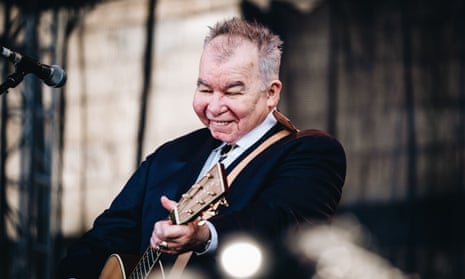As John Prine often pointed out, he missed the height of the 1960s. Drafted into the US army, but fortunate enough to escape a tour of duty in Vietnam, he spent the Summer of Love stationed in Germany. Prine arrived back in the US at the end of 1967, just as rock music began to leave psychedelic experiments behind and head earthbound again, which suited him just fine.
He was born in 1946 and learned to write songs during the early 60s folk revival by imitating the Carter Family. Eighteen months after he returned to civilian life in Chicago, he saw Bob Dylan and Johnny Cash performing together on the latter’s TV show. “I thought the music I was playing and writing, it’d fit straight in-between the two of ’em,” he recalled in 2019. “I thought, ‘That’s exactly where I want to be.’”
Almost uniquely among the glut of early 70s singer-songwriters, Prine – who has died aged 73 – seemed untouched by the countercultural events of the preceding years: he seemed to tap into an earlier musical tradition, “an authentic, rather catchy extension of Nashville and Appalachia”, as critic Robert Christgau noted of Prine’s eponymous 1971 debut album. He was not given to writing starry-eyed paeans to the denizens of the Woodstock festival. His albums never sounded as if they had emerged from the stoned, eucalyptus-scented idyll of Laurel Canyon. There was something tough and austere about them, perhaps because of Prine’s voice – a rough, artless, nasal rasp that Dylan suggested sounded as if Prine had swallowed a jew’s harp. It got more gravelly as the years progressed and he recovered first from neck, then from lung cancer.
Prine wasn’t a musical innovator. He occasionally threw his audience a curveball, not least when he released, in 1979, Pink Cadillac, a rockabilly-infused album filled with slurred vocals and raw-sounding performances – an amplifier fritzing out was audible throughout the track Saigon. But for the most part, his music stayed within a territory bound on one side by country and folk and on the other by old-fashioned rhythm and blues.
Prine was an extraordinarily gifted songwriter. Gruff, funny, empathetic, imaginative, he was a born storyteller. When playing live, his peers might occasionally “rap” with the audience, but Prine seemed as much in his element spinning lengthy yarns between songs as singing them. Devotees of his debut album – or the acclaimed Bruised Orange in 1978, or his 1991 “comeback” album The Missing Years – might disagree, but there is a compelling argument that the best way into his work is his 1988 double album John Prine Live. Recorded when Prine had fallen out of fashion and was back playing clubs, it strips everything back to guitar and vocals. Occasionally, the intros last twice as long as the songs.
He could write apparently straightforward country hits that, on closer inspection, were never quite as straightforward as they seemed. A US Top 10 success in 1975 for David Allan Coe that Prine co-wrote with Steve Goodman, You Never Even Called Me By My Name, was both a livid assault on the country music industry and a parody of the genre’s cliches: “I was drunk the day my mom got out of prison and I went to pick her up in the rain / But before I could get to the station in my pickup truck, she got runned over by a damned ol’ train”. Prine feared it would so offend the Nashville establishment that he asked for his name to be removed from the credits. He saw himself as someone who wrote about real life and became a protest singer by default: the Peabody Energy company took such exception to Paradise, his 1971 depiction of the effect of mining on his father’s home town in Kentucky, that it printed a pamphlet denying the song’s claims. “It was crazy,” Prine protested. “They made me into a Woody Guthrie character.”
Prine could conjure up heartbreaking portraits of drug-addicted Vietnam veterans or divorcees in penury; he could write drily funny accounts of domestic disputes and small-town life, and he could wittily imagine what might have happened to Jesus during the 18 years of his life unaccounted for by the Bible: “He went to France, he went to Spain / He found love, he found pain / He found stores, so he started to shop / He had no money, so he got in trouble with a cop.”
If you didn’t believe the critics, the volume of whose praise usually dwarfed his sales, you could take note of the reverence in which he was held by his peers. He was discovered by Kris Kristofferson, who saw him performing in a deserted club and, after his set, demanded that Prine return to the stage and play it again, along with “any other songs you got”.
Prine wasn’t the only artist to labour initially under the “new Dylan” tag, but he was the only one who could boast such a degree of cheerleading from Dylan himself, who played harmonica on stage with Prine and praised his work as “pure Proustian existentialism – midwestern mind-trips to the nth degree”.

When Prine made a rare attempt to court commercial success with The Missing Years, Pink Floyd’s Roger Waters and orchestral arranger to the stars Michael Kamen each wanted to produce him. The job went to Howie Epstein of Tom Petty and the Heartbreakers, and the stars who got involved included Petty, Phil Everly, Bonnie Raitt and Bruce Springsteen.
Then there were the cover versions, by everyone from Cash (who recorded Sam Stone, but declined to sing its most shattering line: “Jesus died for nothing, I suppose”) to Bette Midler and Loretta Lynn. If you want evidence of Prine’s influence on subsequent Americana, look at the cast list of the tribute album Broken Hearts and Dirty Windows, which features Lambchop, My Morning Jacket, Conor Oberst and Bon Iver’s Justin Vernon. If you want to know about the spell his work cast over a new generation of left-field country stars, then look at the artists who flocked to collaborate with him in the autumn of his career: Brandi Carlile, Kacey Musgraves, Alison Krauss, Miranda Lambert, Lee Ann Womack.
Indeed, the respect afforded him by younger artists helped garner an unexpected Indian summer in his career. The Tree of Forgiveness in 2016 was effectively John Prine doing what John Prine had always done: it was understated, alternately moving and funny, not least When I Get to Heaven, on which he detailed his ambitions for the afterlife, including drinking cocktails, taking up smoking again and settling scores with “a few choice critics … those syphilitic parasites”. It was the highest-charting album of his career.
When the news broke that Prine was in a critical condition with coronavirus, a cross-generational selection of artists began posting covers of his songs online in tribute. Wilco’s Jeff Tweedy sang Illegal Smile; Colin Meloy of the Decemberists sang Angel from Montgomery. Joan Baez, meanwhile, sang Hello in There, Prine’s impossibly moving song about a lonely elderly couple, with its closing plea for companionship and understanding: “If you’re walking down the street sometime and spot some hollow ancient eyes / Please don’t pass ’em by and stare as if you didn’t care, say, ‘Hello in there, hello.’”
The tributes seemed to sum Prine’s career up: a beloved but unassuming genius, who let more famous voices spread the word about him.

Comments (…)
Sign in or create your Guardian account to join the discussion